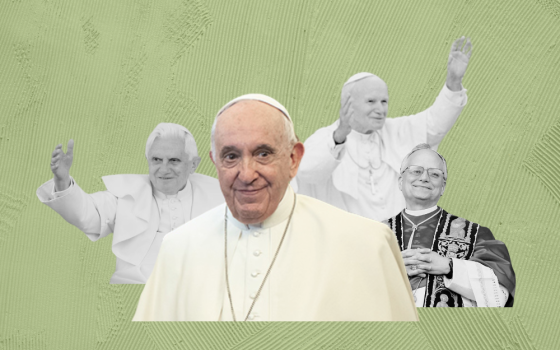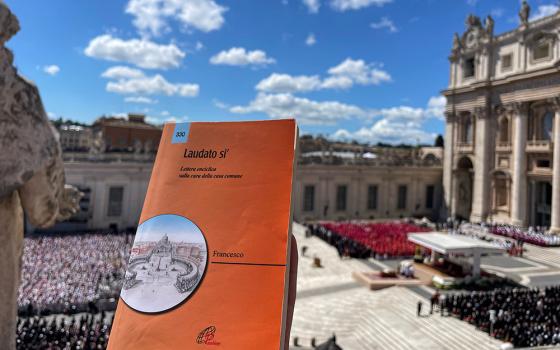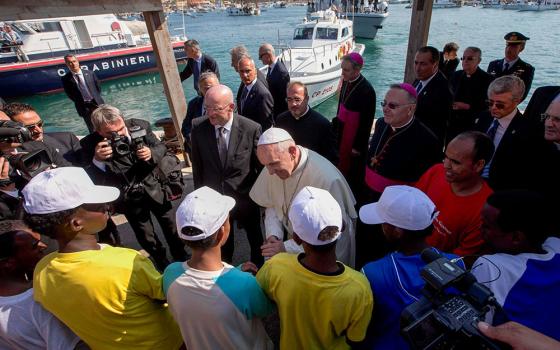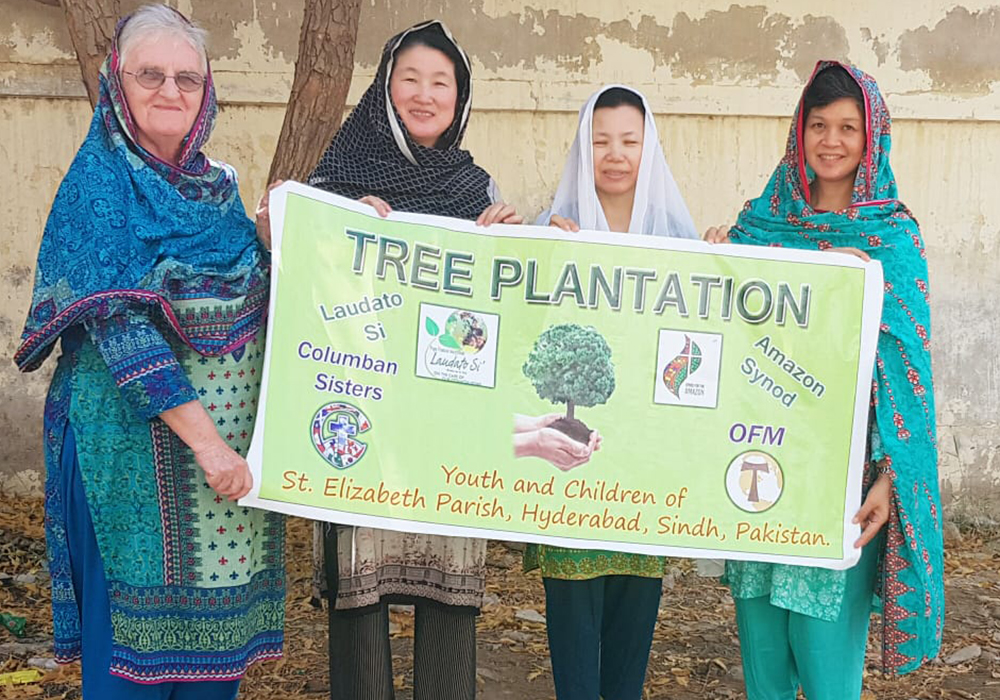
From left: Srs. Rebecca Conlon, Yoonmi Kim, Ha-suk Shin, and Anne Carbon, Columban Sisters from Latifabad, Hyderabad, in Pakistan, participate in a demonstration on Nov. 6, 2019, advocating for greening initiatives in Hyderabad following the 2019 Amazon synod. (Jawed Munawar)
Since Pope Francis introduced "Laudato Si', on Care for Our Common Home" in 2015, sisters around the world have been listening deeply to the cry of the Earth and the cry of the poor. With hearts attuned to creation's wisdom and wounds, they have planted trees, restored watersheds, accompanied displaced communities, and invited others into ecological conversion.
And so, this month we ask our panelists: What can we learn through, from and for nature? What kind of threat does climate change pose to peace? What are you doing to change it?
Their responses reflect the living legacy of Pope Francis' love for creation — a legacy that continues to inspire us to care for our common home with tenderness and reverence.
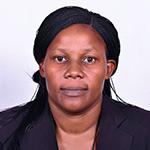
Damaris Muthusi is a member of the Sisters for Christian Community, a trainer and a resource mobilization expert, consulting with faith-based organizations, nongovernmental organizations and community-based organizations on organization sustainability and strategic management. She lectures at Tangaza University in Kenya, teaching organizational management, child safeguarding and protection, social entrepreneurship, development studies and spirituality for social transformation. She holds a master's degree in social ministry with a focus on organizational management, among other certifications. She is pursuing a doctorate in social transformation, researching community engagement and food security. She also mentors youth and children and is a member of several professional and religious bodies dedicated to societal transformation.
Nature is an awe-inspiring patchwork of life — vibrant forests, oceans, mountains and skies. Wildlife hums, the wind whispers, and life coexists harmoniously even as it continues to change. In nature, we learn endurance, interdependence and balance.
Studying ecosystems teaches us about adaptation, collaboration and sustainability. Nature reveals patterns of growing, recycling and ingenuity. It also reveals resilient life forms thriving in diverse environments.
I am always moved by how trees grow intertwined, supporting weaker plants or peacefully embracing each other as they grow. From nature, we learn the significance of preserving the environment, respecting biodiversity and understanding our role in protecting the planet. In essence, nature offers wisdom on how to live harmoniously, sustainably and with gratitude for the world around us.
Damaris Mathusi, alongside students at Tangaza University in Nairobi, Kenya, plants trees in August 2024, following her session on community engagement for transformative development. (Courtesy of Damaris Mathusi)
Climate change today endangers peace by intensifying resource scarcity, displacement and conflict over water, food and land. Rising temperatures and extreme weather increase competition for these resources, breeding social unrest and political instability. When communities face environmental stress, tensions heighten, creating the risk of violence and war, especially in vulnerable regions already facing economic or political challenges.
Serving among pastoralists in Isiolo County in Kenya has helped me understand the pain of climate change. I witnessed a woman killed by a buffalo at a water source, where the animal had strayed from a reserve in search of water.
Influenced by St. Francis of Assisi, whose profound love and respect for nature led him to call all of creation his brothers and sisters and emphasize care for the environment, I joined the Global Laudato Si' Movement.
As a certified animator, I have implemented my capstone project to address the challenges of climate change and bring Laudato Si' to life. The project involves raising a prophetic voice in local communities to adopt climate-smart initiatives. I facilitate tree planting with students and promote student-community collaborations on transformative initiatives, such as a Kiio-rock water harvesting project in Kitui County in Kenya.
As Pope Pius XII noted, "Peace is the fruit of justice." I want to help create a just community where every member has access to resources and uses them responsibly, with future generations in mind. Promoting collaborative sustainable initiatives is then vital. As Pope Francis calls us, we should get involved to redress the damage caused by human abuse to God's creation (Laudato Si', Paragraph 14).
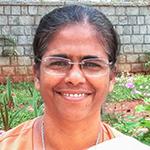
Deepa Moonjely is a member of the Dominican Sisters of the Presentation, currently residing in Kerala, India. She is preparing to embark on an exciting new mission to Indonesia, where her congregation is establishing new communities. With a strong background in education, she has dedicated much of her life to teaching and nurturing young minds. She has also served in various administrative roles, including as a school principal, provincial councilor, and provincial, gaining valuable leadership and organizational experience in service to God. Her journey has taken her across India and several other countries, broadening her perspective on faith, education and service. Deeply passionate about her vocation, she is eager to serve those in need as she embarks on this new chapter in Indonesia.
Our response is both personal and communal. The Dominican Sisters of the Presentation address the climate change crisis by forming community-based organizations such as children's parliaments, women's groups, farmers' groups, and youth groups. Each group has an environmental minister dedicated to sustainability efforts, ensuring collective responsibility for stewardship.
We prioritize renewable energy by installing solar panels for lighting and water facilities and promoting sustainable biomass energy sources, such as crop waste and animal manure, for cooking. We advocate for greener transportation, maximizing public transit to reduce carbon footprints.
Sustainable practices are central to our mission. We combat deforestation and restore green cover by planting trees. We emphasize organic farming, water conservation through rainwater harvesting, check dams, and canals, and waste reduction through recycling, and composting.
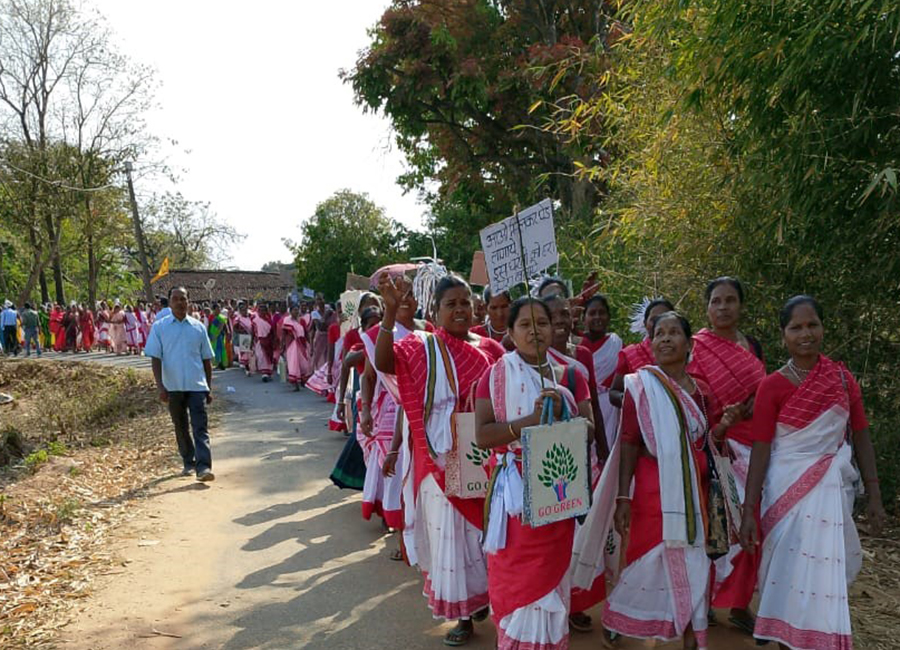
Women from a self-help group in Tirra, Jharkhand, India, display "Go Green" placards, demonstrating their dedication to environmental awareness. (Courtesy of Deepa Moonjely)
To strengthen climate resilience, we educate communities on early warning systems for extreme weather and build climate-resilient infrastructure, such as soil embankments to prevent erosion. Farmers are supported with climate-smart agricultural strategies to adapt to unpredictable weather.
Education is key to fostering ecological awareness. As religious women, we have platforms to shape consciences and promote ecological conversion, as Pope Francis urges in Laudato Si'. We integrate sustainability into daily life — minimizing waste, conserving resources, and choosing ethical consumption. Personal actions — such as using energy-efficient appliances, reducing food waste, and avoiding single-use plastics — reinforce our commitment. But systemic change is essential for long-term impact.
Finally, we must pray and act in hope. The kingdom of God is both a promise and a task. Jesus stilled the storm (Mark 4:39), showing that peace is possible amid chaos. But he also calls us to co-create that peace — through justice, stewardship and love. Climate change is not only a scientific issue; it is a call to discipleship. The question is not whether we can make a difference, but whether we will choose to.
Let us choose to. For nature, for peace, for the Gospel.
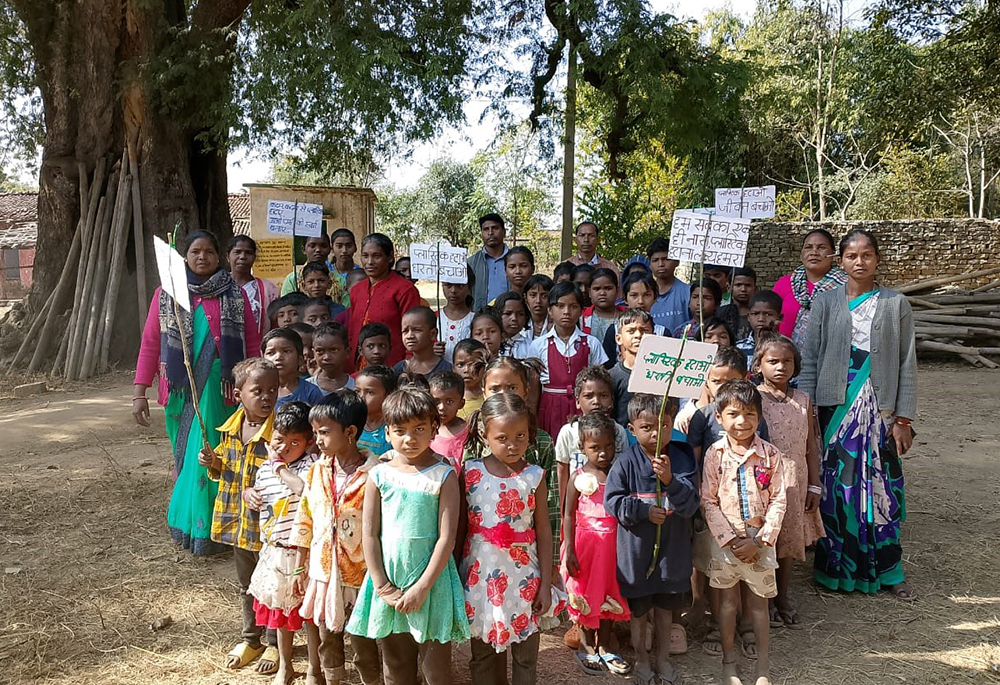
Children from a children's parliament in Tirra, Jharkhand, India, participate in community leadership and development activities. The photo was taken by the project coordinator. (Courtesy of Deepa Moonjely)
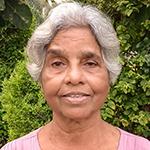
Joel Urumpil is a dedicated member of the Sisters of Charity of Nazareth, Patna Province, whose motherhouse is in Nazareth, Kentucky, in the United States. At 81, she remains a full-time social activist, committed to systemic change and grassroots development. In 1988, she left formal convent life to immerse herself in a people's movement in remote Jharkhand, where she has lived for 35 years. Together with local communities, she founded Chetna Bharati, an organization focused on rights-based issues and educational empowerment. As chief functionary and patron of a women's organization, she oversees remedial coaching, residential camps for marginalized youth, and support for aboriginal tribes and Mahadalits in vulnerable circumstances.
'My soul, I see the approaching summer; the sun's eyes are ripening the grain. Let's tend the fruit nature has lavished upon us. Let's lay upon beds of grass; the sky shall be the blanket. Our heads together upon pillows of hay and relax after the day's toil.'
—Avinash Patra, "Season's Love"
But alas, the rumblings! Nature seems disturbed: mountains crumbling, earth breaking. Humans, though part of nature, are attacking themselves. The brook, the breeze, the placid river and the magnificent sea are becoming unstable. Greed and the pursuit of comfort have overpowered the relationship between nature and humans.
Deadly demands for quick profit are destroying the self-reliance of nature. But nature doesn't keep quiet!
Heat becomes oppressive — the sun's rays are blistering. The wind shrieks in desperation, uprooting giant trees and sturdy buildings. Lush green earth turns to desert! The sky opens its flood gates, drowning the earth and all upon it. Mother Earth, choked with dust, floodwaters and acid rain, trembles and collapses — throwing up uncontrollably from deep within her belly fire and fumes.
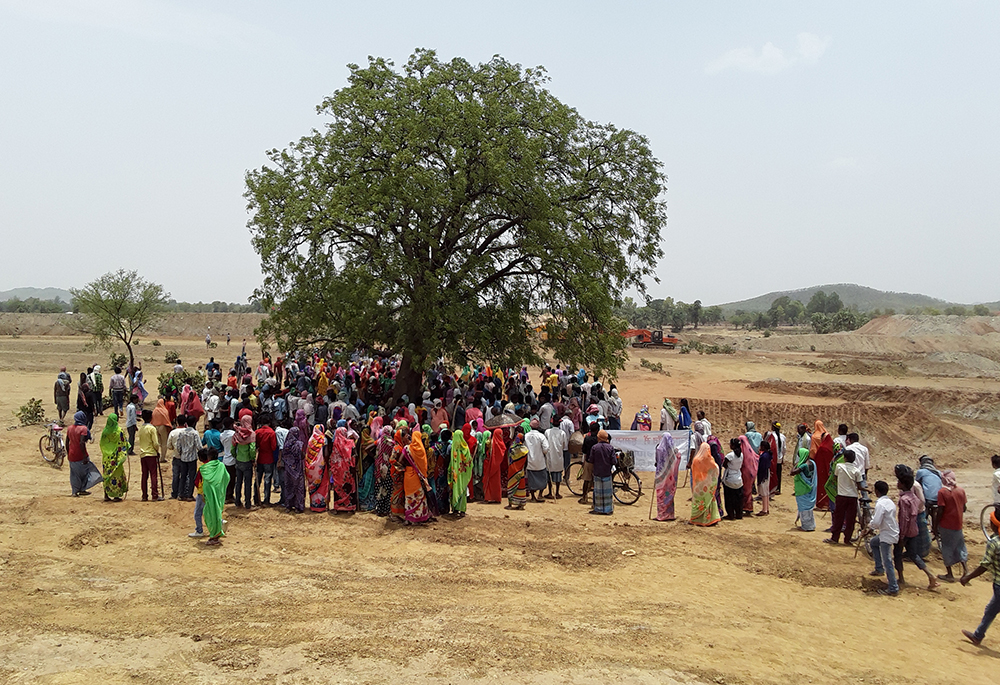
Villagers from six communities gather under a tree near a closed stone mine in Pachuara, Dumka District, in Jharkhand, India, celebrating their grassroots victory over mining. The spontaneous gathering included dancing, speeches, and slogans like "In our villages, we rule," and "Land, forest, water belong to us," sending a message of unity and people power. The late Sr. Valsa John of the Sisters of Charity of Jesus and Mary had lived and resisted mining in the area for many years among the Santhal tribes. (Joel Urumpil)
Yet she still hopes. She closes her pores, dries her surface, and enters into hibernation, waiting for regeneration.
I spent many years trying to stop open-cast coal mining, opium cultivation and stone – sand extraction. The people united, there was success in some cases, but also loss. We witnessed the assassination of leaders like Sr. Valsa John! And the mafia continued destruction, leaving behind huge open pits, barren land, and the expulsion of people — slaves to the mining mafia.
Yet I hear Nature telling us:
- Life cannot be annihilated — birthing and resilience are a part of her essence. She glides from one season to the next and never remains static, no matter how comforting. Weariness is not in her system.
- Don't be impatient with the slow — synodality is the norm. When humans disturb it, nature rises in defense through her ecosystem.
- Follow the rhythm — the leaves — ornaments of the trees — must fall to make space for the new.
- Be on guard against stereotypes — the seasons flow into one another in constant newness.
- The dutiful sun caresses and pierces — reminding us of life's changing moods and demands.
Nature exposes my self-centeredness. She reminds me to be tended by my companions — just as the roots of certain trees hold one another from falling. She teaches eternal truths: unity, interconnectedness and love at any cost. Will there come a day when nature becomes humanity's teacher, and humanity becomes the book through which I learn and experience the embrace of the universe — its mysterious life process?

Karen Englebretsen of the Sisters of the Cross and Passion was born in Aotearoa, New Zealand, where her oma's secret baptism sparked her faith. At 16, she became Catholic, inspired by the sense of community. After completing teaching qualifications and traveling, she felt called to join the Sisters of the Cross and Passion, moving to Australia nearly 10 years ago. Now based in Melbourne, she serves as a spiritual care worker in the homeless sector, opening the mission house doors to each person she meets. Inspired by her foundress, Elizabeth Prout, she responds with courage and compassion to the needs of the day.
Ecospirituality is my heart language — my fire, my joy, my call to action. I remember the electrifying energy when Pope Francis released Laudato Si'. It was more than an encyclical; it was — and continues to be — a movement. Study groups sprang up, a new language of interconnectedness took root, and for a moment, it felt as though the world might actually listen, hear, see and act.
But now, looking around — at Mother Earth, at our communities — the cry of Earth is clearer than ever. It is a call to heal our relationship with Earth, one that requires more than policies and pledges, protests and research. It demands a conversion of both spirit and ecology. A transformation of the heart. And it all starts with the self, flowing outward.
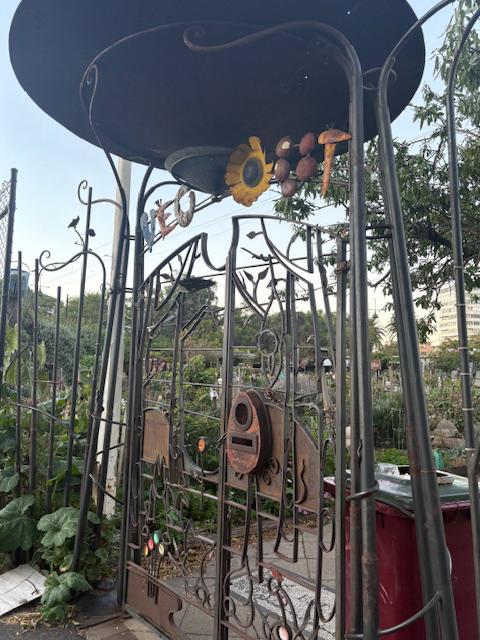
Veg Out Community Garden in St Kilda, Melbourne, a vibrant, volunteer-run space promoting sustainability and community connection (Karen Englebretsen)
Laudato Si' reminds us that we are not separate from nature but deeply woven into its fabric. It's easy to nod in agreement — "Amen! Thanks be to God!" — but to truly witness this reality is something else entirely. It is to be undone by the beauty of creation, to recognize that we belong to the earth just as the rivers, the trees, and the wind do. From dust we are created.
Recently, in my ministry at our homeless outreach center, I have been walking alongside individuals on their Alcoholics Anonymous and Narcotics Anonymous journeys — pilgrims of hope, seeking renewal. The structure and foundation of the programs challenge them to trust in something beyond themselves. The question of God's nature stirs deep uncertainty, and yet, the gift of dwelling in creation — of witnessing the overwhelming unconditional love that sprouts from nothing — is a pure reflection from creation to self.
Advertisement
It is seen at the 40-day milestone, in the gift of something small: a handful of tomato seeds and soil. At first, the weight of caring for something — even as tiny as a seed — seems overwhelming. But then, slowly, quietly, the invitation takes root. The seed sprouted. A tiny leaf emerges, not yet fruited. A fragile stem reaches upward. And in that moment, something shifts. Curiosity turns into reverence.
This is the conversion Pope Francis speaks of. A transformation not just of intellect, but of soul. It is the profound realization that in tending to life — no matter how small — we are drawn into a web of belonging. The seed is not just a seed. It is a mirror, a teacher, a doorway into something greater.
And perhaps, if we allow ourselves to listen, it is also the beginning of healing — not just for Mother Earth, but for all of us.

Rebecca Conlon, from Ireland, is a member of the Missionary Sisters of St. Columban. She began her mission in Korea as an occupational therapist before transitioning to congregational services including formation. After spending 33 years in Pakistan, where she worked pastorally with the Christian community and engaged in a dialogue of life and work with Muslims, she is now adjusting to life in Ireland. Dialogue was central to her mission approach. Additionally, she served on the Congregation Central Team for the past six years while residing in Pakistan.
Experiencing the effects of climate change first hand in Pakistan is like looking back upon utter devastation. Two peak instances stand out for me: the floods of 2010 and 2022.
In September 2022, I stood on a road outside Dadu, in Sindh Province, and looked out as far as the eye could see. Right to the horizon was a massive lake stretching in all directions. Seeing these floods of biblical proportions and the scenes of people on the move setting up their make-shift 'homes' on the side of the roads numbed my heart, and left me speechless. These people were among the estimated 33 million displaced, as a third of the country was submerged under water, resulting in over $30 billion in damages and losses.
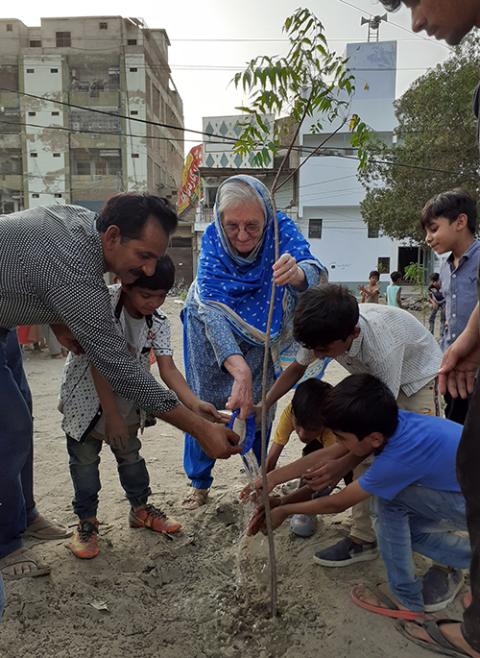
Local lawyer and social activist Soobah Bhatti joins Sr. Rebecca Conlon and children from the area in planting a tree on May 16, 2021, in Latifabad, Hyderabad. The ongoing project fosters community roots and includes dialogue with the local municipality, promoting Christian-Muslim dialogue. (Courtesy of Rebecca Conlon)
In May 2022, Pakistan experienced a severe heat wave, with temperatures reaching 51°C, resulting in drought, followed by record-breaking rainfall — about 190% more than its average for June to August. Its climate history ranks it as the fifth most vulnerable country in the world to climate change. Pakistan contains over 7,000 glaciers — more than anywhere else in the world outside of the polar regions — and as the world warms, glacial ice melts high up in the majestic Himalayas, unleashing millions of cubic meters of water into the River Indus River and its valleys, mercilessly swallowing up everything in its path as it swirls towards the sea. The Indus, Pakistan's life source, sustains the nation.
The people sheltering on the road have one of the smallest carbon footprints in the world yet are the ones suffering the most. Pakistan contributes less than 1% of the global greenhouse gases warming our planet, and these "little people" are paying the price with their lives for the industrialization of rich countries that has led to this catastrophe. Their loss of livelihoods, food insecurity, mass displacement — their belongings, crops and animals swept away — crop failures leading to food-shortages, bio-diversity extinction, migration from rural communities to major cities, education put on hold, drought, overall damage to public infrastructure and rising poverty levels all place significant stress on the economy, ecosystem, society and security, with direct implications for peace.
They also live in one of the most politically volatile regions in the world. Ongoing rivalry and tension between nuclear-armed Pakistan and India have persisted since partition, as source rivers of the Indus basin lie in India and are therefore under its control. This scenario compounds the dangers and presents a recipe for disaster — unless there is good governance.
What can we do? Only together can we make a difference: raise awareness; hear the migrant's story; network and speak against climate injustice and biodiversity loss; support those who are nurturing the seeds we planted together. We are forever interconnected and interdependent — with creation and with each other. Climate change is not God's will, but our own will to suffer in order to make change happen.




